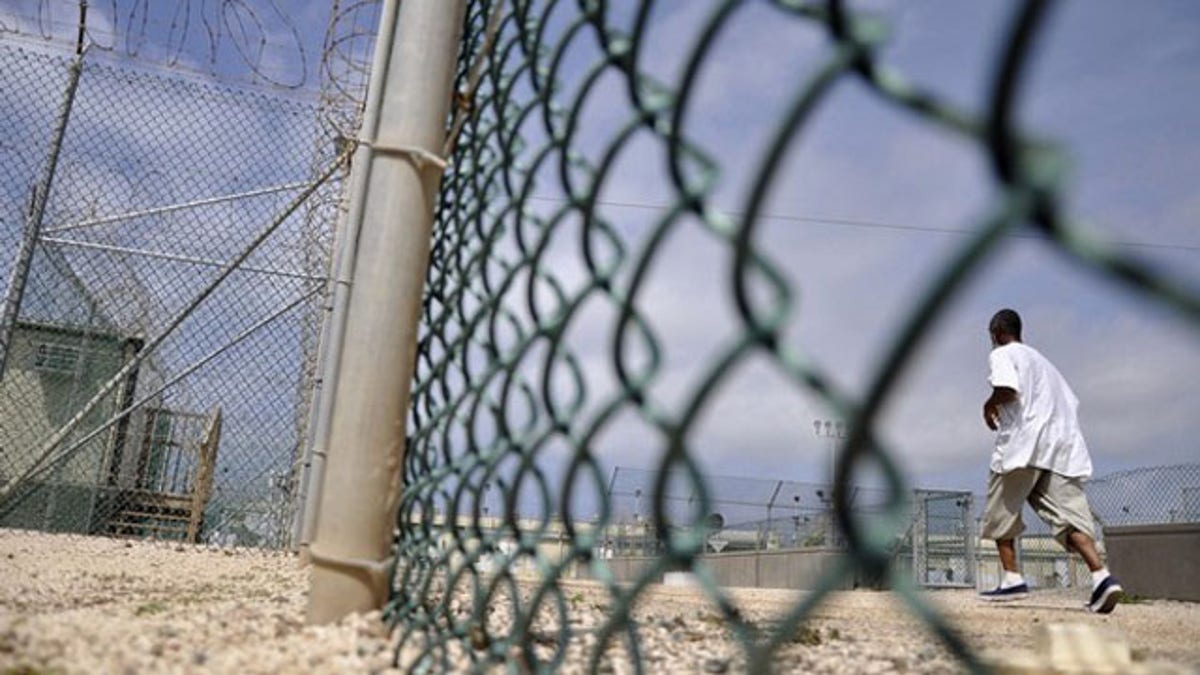
FILE: April 27, 2010: A Guantanamo detainee exercising inside the detention facility, at Guantanamo Bay U.S. Naval Base, Cuba. (Reuters)
The American Civil Liberties Union is calling for an independent investigation into all prisoner deaths at Guantanamo Bay after a 48-year-old Afghan detainee collapsed and died.
The U.S. military said the prisoner, Awal Gul, died of "apparent natural causes" on Tuesday, collapsing in the shower after working out on an elliptical machine. Military spokesman Army Col. Scott Malcom said the death was still under investigation but that an autopsy completed Thursday appeared to indicate a heart attack or a pulmonary embolism as the cause.
The ACLU released a statement Friday saying that, especially since Gul was one of nearly 50 detainees being held without charge, a fuller inquiry is needed.
"Mr. Gul's death makes clear that the longer we continue to hold men at Guantanamo without any accountability or adequate legal process, the more independent scrutiny of their well-being is required," Hina Shamsi, director of the ACLU's National Security Project, said in a statement.
"Given the lack of transparency at Guantanamo, each and every death there should be fully and independently investigated."
Gul is the seventh prisoner to die at the detention center since January 2002, when the U.S. began using the American Navy base in southeastern Cuba to hold captured detainees suspected of links to Al Qaeda or the Taliban. Five other deaths were declared suicides. Another was from colon cancer.
Gul had been held more than eight years without charge, and the military said in a statement that he was an "an admitted Taliban recruiter" who operated an Al Qaeda guesthouse and had met several times with Usama bin Laden, "providing him with operational assistance on several occasions."
But Matthew Dodge, one of the lawyers who filed a writ of habeas corpus to force the government to release Gul, said the military's allegations were "outlandish" and that "the government never even made these claims until now, when Mr. Gul is not alive to defend himself."
Dodge said the government had slated him for indefinite detention because authorities had no evidence to support a prosecution.
Dodge said Gul had been part of a local force in the 1980s that was allied with the United States during the Soviet Union's occupation of Afghanistan and only later joined the Taliban because he had no choice.
Gul resigned from the Taliban more than a year before the attacks of Sept. 11, 2001, because he considered them "corrupt and abusive," Dodge said, and he was arrested by U.S. forces in December 2001 when he voluntarily traveled to meet with American military officials in Afghanistan.
"Mr. Gul was never an enemy of the United States in any way," said Dodge, a federal public defender in Atlanta.
An investigation of Gul's death was being conducted by the Naval Criminal Investigative Service, which the military said was standard procedure. The same agency investigated the deaths of three prisoners in an apparent suicide in 2006.
Families of three men sued the government, alleging a cover-up in the 2006 deaths. The case was dismissed in federal court, but the men's relatives still have doubts about the adequacy of the investigation and plan to appeal, said their attorney, Pardiss Kebriaei of the New York-based Center for Constitutional Rights.
As for Gul, "We would call for a timely and transparent and meaningful investigation, which from our point of view has not been done in the case of any deaths so far at Guantanamo," Kebriaei said.
The Associated Press contributed to this report.




